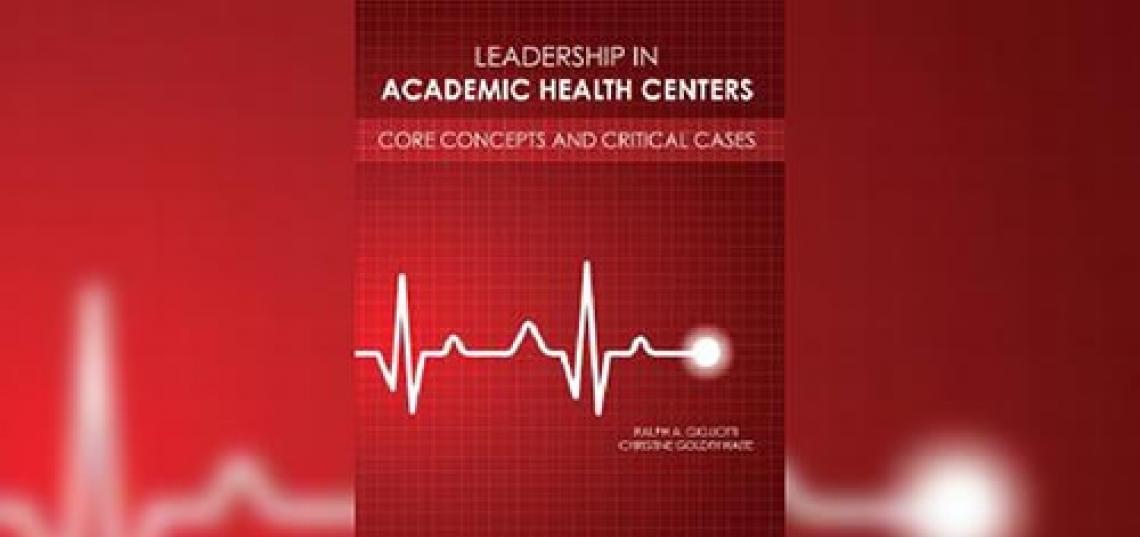
Inspired by their work with leaders at Rutgers Biomedical and Health Sciences, leadership experts Ralph Gigliotti and Christine Goldthwaite have written a new book to serve as a resource, guide, and source of inspiration for leaders and aspiring leaders in academic healthcare environments who wish to create change, navigate crisis, and pursue organizational excellence.
Working in collaboration with healthcare leaders from across Rutgers University, their book, “Leadership in Academic Health Centers: Core Concepts and Critical Cases” was just published by Kendall Hunt. Gigliotti is the director of the Rutgers Center for Organizational Leadership, a part-time faculty member at SC&I, and an alumnus, having earned a Ph.D. from SC&I in 2017. Goldthwaite is assistant director of the Center for Organizational Leadership, a SC&I part-time faculty member, and a SC&I alumna, having earned her master’s degree (in 2010) and Ph.D. (in 2018) at SC&I.
“As we have learned from our research, experiences, conversations, and observations, effective leadership in an academic health environment—as a relational and social endeavor—calls for a commitment to meaningful engagement; dialogic communication; purposeful and goal-centered approaches to assessment, planning, change, and crisis; and the cultivation of an environment and culture where others can do their best work,” Gigliotti said.
“Leadership in academic health centers extend far beyond individual leaders and requires more than developing an ambitious vision and demonstrating a history of academic excellence in one’s career.”
Drawing upon critical incidents they discovered through conversations with academic health leaders about their experiences and challenges as leaders, in the book Gigliotti and Goldthwaite present cases and concepts that explore connections to existing leadership, communication, and higher education/academic health literature, and encourage readers to apply the content to their experiences of leading in their own work environments.
Leaders in academic healthcare settings face particular challenges that most likely would be foreign to leaders in other work environments, Goldthwaite said, and part of the reason for this is “academic health centers are culturally hybridized entities—operating as a healthcare system within an institution of higher education—and there is an expectation that academic leaders respect the unique cultural differences of both entities while also blending aspects of both distinct cultures into one organization.
“In addition, academic health organizations also regularly find themselves in the midst of internal change related to processes, procedures, practices, systems, and structures—all of which impact the lived experience of members of an institution. Such changes might include the merger of different units, the implementation of new electronic medical record systems, the design of new processes for monitoring chronically ill patients, the development of new practices for graduate medical education, and the demand for greater individual and institutional accountability.”
These demands have always created urgency, but today, they are more critical than ever, as the coronavirus pandemic has further complicated the work of academic health centers and accelerated their need to adapt to meet new challenges.
“We highlight the implications of COVID-19 throughout the book,” Gigliotti said. “Crises of all kinds, and especially the current pandemic, are challenging moments for academic leaders. The impact of the pandemic on all sectors, including academic health centers who are situated on the frontline of addressing the public health emergency, has been extensive.”
Brian L. Strom, M.D., M.P.H., the inaugural chancellor of Rutgers Biomedical and Health Sciences, is one of the contributing authors in the book. He co-authored a chapter with Steven Andreassen, Chief of Staff for RBHS, titled “Creating an Academic Health Center for New Jersey: A Case Application of Rutgers Biomedical and Health Sciences.”
“Their chapter describes some of the initial steps taken by RBHS leaders in designing an organization that is well-positioned to respond to the challenges facing academic health centers,” Gigliotti said. “They highlight key themes that guided their process and some of the preliminary results of these efforts, and conclude with leadership lessons for aspiring and current leaders in academic health.”
Working closely with RBHS colleagues and colleagues from within the Center for Organizational Leadership, including Brent Ruben and Sara Spear, on the book was an exciting experience, they said, and involved a balance and integration of their roles as researchers, leadership and communication educators, and organizational consultants. “The cases and themes presented throughout this book reflect many of the insights, challenges, and strategies that emerged as most salient in our formal and informal interactions with colleagues across the academic health center,” they said.
The book will be used as a core text for the Academic Leadership Program at RBHS – a one-year leadership development program designed for faculty administrators (e.g., chairs, program directors). Readings from the book will also be used in other settings across RBHS, including the Distinction in Leadership in Academic Health program with Robert Wood Johnson Medical School, and it will also be used as a supplemental resource for ongoing consultations with units across RBHS.
“It is our hope,” Goldthwaite said, that this new book is valuable to current and aspiring leaders across the academic health landscape.”
Discover more about the Communication Department at the Rutgers School of Communication and Information on the website.
Image: Courtesy of Ralph Gigliotti
